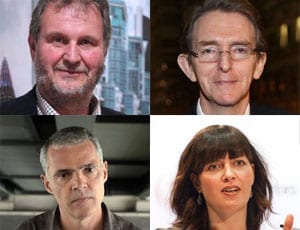Exaro debate raises the flaws in the relationship between government, the media and the police
On Wednesday night just off London’s Fleet Street, Exaro hosted their first debate and asked the question: “Did the media ever hold power to account?” Chaired by the investigate news source’s editor-in-chief Mark Watts and featuring a panel that numbered the academic and former Evening Standard features editor Glenda Cooper, The Sun’s editor-in-chief Tony Gallagher, the freelance lobby journalist and former Guardian Westminster correspondent David Hencke and the screenwriter, author and crusading journalist Peter Jukes, this was an event that – like the publication that hosted it – dared to delve into questions that other parts of the media would rather avoid.
At a time when there are more PR practitioners than journalists and Greenpeace are paying more than The Guardian to recruit members of the press to their causes according to Cooper, the balance of power in the relationship between the media and government (and the police, as Jukes rightly added) has changed. This shift, the panel felt, has not necessarily been for the better but what shone through, is that the mainstream media has somewhat been usurped by social media also.
Whilst Gallagher – who confirmed he would increase The Sun’s investigative reach during his tenure – pointed out that social media is not a “reflection of the real world” but simply an “echo of likeminded people”, Jukes saluted whistleblowers such as Snowden and suggested: “It takes brave individuals to reveal stories… We are all journalists now and there moments when we can all hold power to account”.
Gallagher delved further and argued that “the relationship between the police and the media has collapsed” and that “the police’s refusal to reveal information is the scandal of the age”. Though he referenced examples where the police have protected “the privacy interests of killers, rapists and murderers over and above that of public interest” in failing to cooperate with the press, Hencke did concede that he had “better faith in them now than at any other time in the last thirty years” given they are “trying to get their act together” [in preparation for a forthcoming inquiry into their operations].
Other points raised came in the form of questioning of Exaro’s approach to their investigation into historic VIP abuse from a member of the audience, James Gillespie of The Sunday Times. Though cheered on by a female audience member who shouted: “You wouldn’t put a corpse on trial” – in reference to specific comment about Lord Janner’s forthcoming trial of facts – both Hencke and Jukes were firm in their rebuttals. Jukes concluded that Exaro have “pushed at a door” and “led the way but it is the courts that now should now do the work” whilst Hencke took a more defensive line and remarked:
“We have reported what the police said… If you look carefully, this is a complicated matter… It is one of the most difficult things for journalists to investigate. It involves acts that occurred in private, are historic and lots of information… What Exaro is doing is to put together a lot of bits of information”.
An aside in the debate occurred when Tony Gallagher declared he’d had “a very fine dinner with Chris Grayling last night” in response to a question about Freedom of Information Requests. He continued: “We had a general discussion. I hope I’m not embarrassing him… I don’t kid myself that Mr Grayling wanted my sparkling wit and repartee”. Those of us who joined Exaro in Ye Olde Cheshire Cheese afterwards were lucky to be able to indulge in both from a fascinating array of attendees and what surely must be commended as an especially fine panel.
Subscribe to our free once daily email newsletter here:
